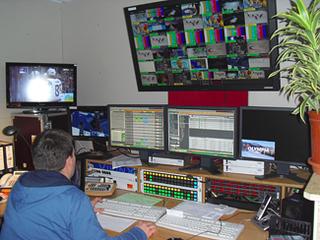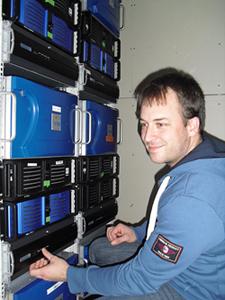ARD, ZDF Tackle Tapeless, HD in Vancouver
EVS Delivers in VancouverServers Maximize Vancouver Games Broadcast
Slo-Mos and XMOs in Vancouver
File Transfers Key in ONC Workflow
NBC: Servers for Broadcast and New Media Production
ARD, ZDF Tackle Tapeless, HD in Vancouver
NAB Workshops on Vancouver Games, FIFA World Cup
German public-service broadcasters ARD and ZDF are prudent and methodical when making technical changes, particularly when covering high profile events.
At the Beijing Games, they made the jump to tapeless, relying on an EVS server infrastructure. Less than two years later they made the leap to full HD tapeless production in Vancouver, and again called on EVS to provide the storage infrastructure and workflow.
The main way ARD/ZDF used EVS servers was in ingest and high-volume production. They had 15 servers — EVS XT[2]s — installed in the International Broadcast Centre (IBC). The majority were six-channel systems, so the 15 machines were capable of managing around 80 channels of record and playback, said Patrick Jung, EVS administrator for the Vancouver broadcast team of the German broadcasters. That’s more than enough to record every feed coming from host broadcaster OBS, yet it fit in a real estate “footprint” substantially smaller than would have been required by traditional VTRs.
In Vancouver, ARD/ZDF recorded and logged incoming feeds on the EVS systems, with material transferred on to an Avid/Isis storage for editors to create finished pieces. If the programming schedule required speedy airing, material was played out directly from EVS servers.
ARD/ZDF also dedicated a few EVS channels for recording a 24-hour loop of all incoming feeds — this way if the production team realized they needed some material they had not requested, they still had a second chance to get that content.
Workflow Advantage

Patrick Jung at his IPDirector Position But the place where having instant access to material in a file-based environment made the biggest difference was in production.
Of all the competitions taking place in and around Vancouver, the competition for dubbed video tapes was quiet in the ARD/ZDF rooms of the IBC. That’s what happens when tape dubs have been replaced by file tranfers.
“For me, the speed of the production is the main benefit,” said Jung . “Now everyone can grab material at any time — if three or four people need something at the same time, it’s just a mouse click away.”
He added that in recent tape-based Games, such as Athens in 2004, a production team was required, with one member of a team spending a lot of time getting tape copies of needed material.
Jung’s main job was managing the master station of EVS’ IPDirector software, which allows an operator to easily ingest, log, search, track and edit clips and highlights, before ultimately playing out the final product.
In the ARD/ZDF facility, IPDirector allowed Jung to control most of the server assets from his PC. He was responsible for all the ingested feeds, and took in requests from all of ARD/ZDF’s journalists on which feeds needed to be recorded and their length. He programmed the ingest scheduler and the ingest then happened automatically.
There were also an additional 15 seats of IPDirector in the 15 edit suites. The journalists used these to search for content via key word or free text, then transfer the material they wanted to Avid as a file transfer.
A Six-Year Arc

Patrick Jung at the Server Rack Jung is familiar with the traditional tape-based workflow at an event of his size, having been there with ARD/ZDF in Athens just six years ago. He has seen the growing importance of the EVS infrastructure as the broadcasters increase the hours of coverage while keeping crew levels under control.
Athens was still essentially a tape-based operation with just a few EVS machines in the mix other than the established slo-mo presence. These were standalone units used for some quick turnaround events. No networking, lots of tapes. This changed totally over the next six years.
Torino saw a substantial increase in server-based production, with 10 XT[2] servers, some XFile storage, and slo-mo servers, but no IPDirector software in use yet. Beijing saw the debut of IPDirector for ARD/ZDF, in an SD set up quite similar in design to the Vancouver HD facility.
And next time? Jung said ARD/ZDF was using Vancouver to evaluate IPEdit, EVS’s on-the-fly quick turnaround editing package that features complete timeline editing performance with no rendering needed for playout.
Jung said ARD/ZDF was now very convinced about the reliability and speed of server based ingest and networked production, and the need for this kind of approach at high-volume events such as a Winter Games.
“It really cannot be done with tape machines,” said Jung. “It would require more people.”
Get the TV Tech Newsletter
The professional video industry's #1 source for news, trends and product and tech information. Sign up below.
